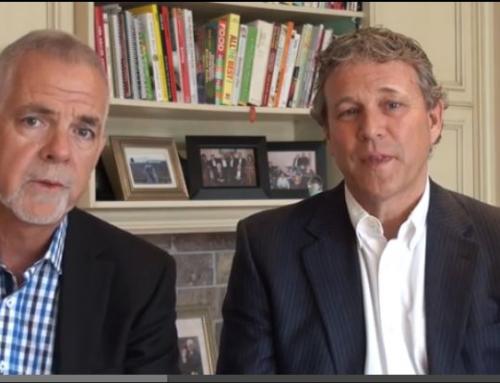Tim Rooney – A seasoned CEO Tim draws on decades of corporate success to help individuals and business owners accelerate their sales growth and build a sustainable competitive advantage.
The 12 most surprising things I’ve learned from 10 years of Sales Training
 Over the last 10 years, I have trained and coached many 100’s of sales people – here are some of the surprising things I’ve learned:
Over the last 10 years, I have trained and coached many 100’s of sales people – here are some of the surprising things I’ve learned:
1. We all sell but …
It’s clichéd to say “We all sell ” – that having been said – most people are absolutely uncomfortable in their “ selling role ”.
2. Head Trash
- Selling technique[s] and processes are critical for success in sales but often they are a waste of time.
- You first need to “get your mind right ” and rid yourself of the “head trash ” that “selling is a dirty word ”
- Sales people need to see themselves as neither inferior nor superior to their prospects
- They need to strive to have “Equal Business Stature ” or as I like to say – “Have Stance Not Arrogance ”
3. Poor sales are most often not a lack of sales ability so much as a lack
of differentiationThis is one of the most challenging problems in today’s highly competitive markets. In most cases it’s virtually impossible to have a truly unique point of differentiation. That s why I like the two “differentiators” offered by these two companies – Avis and SAS.
Avis Car Rental’s long time slogan “ We maybe #2 – but we try harder ” is brilliant in its simplicity.
In the case of Scandinavian Airlines it’s former CEO Jan Carlzon, when SAS was at the height of its esteemed reputation, was asked – what differentiates SAS and he said, “ We don’t aim to be 1000% better at any one thing – but 1% better at a 1000 little things ”.
Research shows that customers want the following things from a service provider:
- Ease of doing business
- Expertise
- Speed
- Intimacy
Most companies have at least one these four requirements – few can say they deliver on all four.
4. You’re never too old or too young for success in sales
- When I was running a start up building products company, the best sales person, by a log way and consistently over a 5 year period was in his late 50’s when I hired him.
- Your success in acquiring new skills is more dependent on having a little intellectual humility and being open to change.
- We also need to recognize we all have “blind spots” and sometimes despite lots of experience “ we don’t know what we don’t know ”.
5. Poor management and leadership are often the biggest problem for poor sales – not the sales people
Symptomatic of failings in this area include the following:
- Poor hiring practices, a failure to build a sales culture, a lack of investment in both time and money developing their sales people and no systematic and fair way to hold their sales people accountable.
6. Many people hoped that the internet and email would fix their “sales problem” – it didn’t!
 7. Then along came social media and they hoped this too would fix their “sales problem” – it didn’t!
7. Then along came social media and they hoped this too would fix their “sales problem” – it didn’t!
- The internet and social media are hugely important for lead generation.
- Writing blogs , having a website and a LinkedIn profile – are essential tools – they “get you into the game ” but they can’t help you close the deal.
8. Marketing frequently has no idea how to help sales people be more effective
- When I did my MBA eons ago – I remember asking the Dean of the Faculty – does the 4 year part-time program have a sales and marketing component . His somewhat dismissive response was that if I wanted that I should go and look at Dale Carnegie! Point being smart people often don’t “get marketing” or the critical function that sales plays as part of the marketing mix.
- Too often I see an inconsistency between the messaging on a company’s website and their marketing collateral and the messaging given to sales people.
- Marketing and sales are too often poorly integrated and aligned leading to sub-optimization for both the company and the sales people.
9. Only 1% of the people I see in sales training, planned to be in sales – the other 99% got their by default
- This unfortunately speaks to the poor perception that many people unfortunately and often unfairly have of sales people. Very few people therefore start out in life planning to get into sales.
- Its critical therefore that sales people know how to build trust as they start with a big disadvantage in any new relationship in being somewhat or significantly mistrusted by new prospects.
10. Behaviour drives attitude and not the other way round
- Waiting to get your attitude right means procrastinating forever – As the Nike ads say “Just do it! ”
11. “You cannot fail at prospecting unless you fail to prospect
This is a build on item 10 and is perhaps my favourite sales mantra.
- Most sales people looking for new customers suffer an enormous amount of rejection which is painful. This is especially true if you are not thick skinned and are considered to be empathetic.
- This rejection means most sales people tend to not spend enough time prospecting
- The most powerful antidote to rejection – which is real – is to remind yourself – anytime you prospect you are winning – because they are only 4 outcomes you can have and they are all good
- A “Yes ” – that’s obvious !
- A “No ” – move on and find someone else to sell!
- A Clear “Next Step ” agreed to between you and the prospect you are in the process of qualifying
- “A lesson-learned ” – you may have “screwed-up” – but you perhaps won’t do it again the next time!
12. On-Going incremental improvement is by far the best way to build a strong sales team and a culture
- There are many moving parts to success in a complex sale and it takes time and regular constant incremental improvement to build a sustainable sales culture.
- One and two day sales boot camps can be useful – to get things rolling , but they typically have short term results unless there is continuous reinforcement.






Leave A Comment